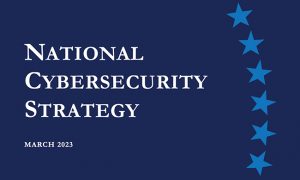 CISA is the nation’s cyber defense agency and the national coordinator for critical infrastructure security, and is an operational component of the Department of Homeland Security (DHS).
CISA is the nation’s cyber defense agency and the national coordinator for critical infrastructure security, and is an operational component of the Department of Homeland Security (DHS).
Under the leadership of Director Jen Easterly, CISA works to understand, manage, and mitigate risk to the nation’s cyber and physical infrastructure in the public and private sector.
Their Strategic Plan defines describes four ambitious goals. Three of these goals focus on “how” the agency will work to reduce risk and build resilience, while the fourth goal focuses internally to ensure the agency is in a strong position to execute the CISA Strategic Plan.
In March 2022 President Biden signed into law CIRCIA, requiring CISA to develop and implement regulations to report covered cyber incidents and ransomware payments to CISA.
The Federal Information Security Modernization Act (FISMA) requires every government agency to develop a method to protect their information systems against cyberattacks. This act was originally passed in 2014, but it was overhauled in 2023 to support more effective cybersecurity methods and improve coordination amongst various federal agencies.
NIST provides a knowledge base of resources to support agency adoption, such as the Cybersecurity Framework.
White House Strategy
In 2023 the White House recently released the ‘National Cybersecurity Strategy‘ report, which outlined the government’s plan to enhance cybersecurity measures and protect critical infrastructure from cyber threats,
It emphasized the importance of collaboration between government agencies, private sector organizations, and international partners to ensure the security and resilience of the nation’s digital infrastructure.
- Strategy 1: Strengthening Cyber Defenses: This strategy focuses on enhancing the government’s ability to detect, prevent, and respond to cyber threats.
- Strategy 2: Securing Critical Infrastructure: Protecting critical infrastructure from cyber attacks is a top priority outlined in the report.
- Strategy 3: Promoting Cybersecurity Innovation: The report recognizes the importance of fostering innovation in cybersecurity to stay ahead of evolving threats.
- Strategy 4: Enhancing International Cooperation: Cyber threats are not limited by borders, and international cooperation is crucial to combat them effectively.
In this video join CSIS for a discussion on the Strategy with remarks from Acting National Cyber Director Kemba Walden, and Deputy National Security Advisor for Cyber and Emerging Technologies Anne Neuberger.




